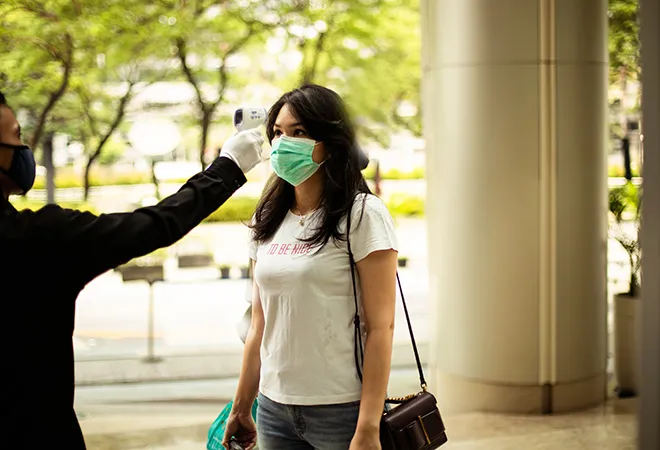
Throughout history, the spread of infectious disease has killed millions, sickened billions, and cost trillions of dollars of global economic output. As the world now struggles to combat the novel coronavirus, it faces the grim reality that it is not just developing countries, but developed ones, that require revitalized and better-coordinated health systems. It is now clear that COVID-19 is a deadly contagion that threatens the livelihoods of all, regardless of socioeconomic status.
Pandemics and epidemics have increased in recent years, catalyzed by globalization, climate change, and rapidly growing populations. Although countries pledged to develop health-care capacity at a global, national, and local level in the wake of previous epidemics, few have achieved the necessary provisions. The resources devoted to mitigating health risks have remained anemic. When health crises hit, they have been managed with dedication and the allocation of essential funds, but are often forgotten after the risks fade. This has left the world vulnerable to pandemics. In 2006, the World Bank estimated that a normal virulent flu could reduce global economic output by almost 5 percent, effectively causing a global recession, assuming the efforts to limit the disease were as ineffective as previous attempts. The COVID-19 pandemic, thought to have begun in November 2019, has spread to more than two hundred countries and territories, affecting the health of more than 2.5 million people and the wellbeing of countless others. The UN Trade and Development agency estimates that the slowdown associated with COVID-19 could cost the global economy up to $2 trillion.
Six months after the novel coronavirus first appeared to have infected humans, several deficiencies in the global response became clear. Recent months have seen considerable misinformation and disinformation circulating among global partners, which has limited the world’s ability to efficiently and effectively respond to the crisis.
COVID - 19: WHAT WAS DONE AND WHAT THE WOR LD SHOULD DO
The first need is the development of a well-rounded health-care system, covering the critical aspects of universal health coverage. After that, how multilateral agencies, policymakers, societies, and individuals coordinate and communicate during a crisis is vital.
The primary flaw in the COVID-19 response has been the opacity in knowledge sharing. China is the first country to claim to have successfully flattened the curve. Research suggests that China’s nonpharmaceutical interventions, such as travel bans, social distancing, isolation, and contact tracing, were effective in containing the outbreak.
The same study, however, indicates that had China taken more ardent measures to contain the spread of the virus earlier, the number of cases could have been curtailed by almost 95 percent. China’s actions and inactions led to an explosion in global infections. It repeated claims against human-to-human transmission, delayed sharing critical information, suppressed research about the virus, and allowed travel within the country despite knowing the threat.
Effective global health governance depends on national transparency and coordination. One approach to efficient management during a pandemic is clarifying the definition of transparency to encourage communication. In an era of globalization, each country has a responsibility toward the regional and global communities it benefits from.
Strengthening Global Mechanisms
During health crises, the world looks to the primary global health agency, the World Health Organization (WHO), for guidance. Surprisingly, the WHO’s response to COVID-19 was lacking. Although the body had once warned that caution and vigilance were necessary against any future Sudden Acute Respiratory Syndrome (SARS)-like disease, it ignored this advice in late 2019 when managing the mysterious pneumonia in Wuhan, China. For months, it failed to recommend travel restrictions or bans. This lackluster response meant that the window of opportunity to tackle the pandemic was missed, raising questions about the WHO’s credibility.
The world needs an unbiased and strict monitoring mechanism to protect people’s rights and health. The WHO seems caught in the crossfire of a political battle among global powers, which has limited its ability to act effectively. Prudent and proactive emergency responses are needed to tackle any health emergency that may emerge. An appropriate and active auditing system to ensure that multilateral agencies as well as countries and policymakers are held accountable for their actions is essential.
Medical Advancement and Innovation
In 2005, Bill Gates warned that, due to inadequate investment in epidemic prevention, a highly contagious infection, rather than war, would be the most likely cause of millions of deaths worldwide. The expansive spread of COVID-19 and its asymptomatic nature underscores Gates’s alarm.
A critical pillar of tackling a pandemic is innovation and advancement in medical research. This has been sorely lacking. Such advancements have seen meager monetary support, and have been duly ignored by heads of state. In 2005, China was warned against the use of wet markets because the conditions lead to a higher probability of infections transferring from animals to humans. The increasing popularity of consuming exotic animals in China and the prevalence of SARS-like viruses in these animals was referred to as a ticking time bomb. These warnings were ignored.
Preparedness for an epidemic requires a trilateral design. First, scientists need to rapidly create the epidemiological, genomic, and clinical data of the disease. Second, international actors and states need to record the progress of disease containment, focusing on monitoring a state’s capacity to tackle the situation. Third, tracking the progress on vaccinations and diagnostics is essential to identifying barriers in production and equitable distribution. Global leaders, multilateral institutions, private organizations, and donors should ensure adequate investment in medical research, vaccine development, and
epidemiological and genome mapping to strengthen the efficacy of the health system to contain widespread diseases.
Capacity Building
COVID-19 has rendered some of the better health systems in the world inoperable. A country’s first line of defense is the capability of its health system to detect and control contagious diseases. Underinvestment in preparedness and reliance on treatment rather than a preemptive response has proven costly in terms of lives and dollars.
Addressing a swiftly spreading pandemic requires having readily available high volumes of medical facilities and health workers proportionate to the population. Most countries have not devoted the necessary funds or consideration to developing these requirements. Immediate action and attention from policymakers is needed.
Consequently, given the world’s vast population, community-level capacity building is also needed. Communities should be prepared to educate, provide for, and undertake strict measures to curb the spread of infectious diseases. Governments should educate and prepare communities by conducting routine simulations. In addition to devoting the necessary domestic resources for infrastructure development, governments should also invest in preparedness to maintain global and national security.
Global Coordination
A pandemic that has infected millions of people cannot be mitigated using unilateral approaches. The novel coronavirus has led countries to ban not only the movement of people but also the equipment needed to combat and contain it, such as personal protective equipment. Governments are primarily responsible for their populations, but a global crisis calls for solidarity.
Countries should build their national health systems and promote medical research and innovation. Countries also need to develop systems that share necessary epidemiological and genomic data, vaccines, and other medical countermeasures. At this crucial time, policymakers and communities should support each other and the vulnerable groups around them.
A pandemic is a global problem that requires a global resolution. Administrative setbacks, lack of coordination, and deficient communication can cost the world the valuable time needed to save lives.
This essay originally appeared in CFR
The views expressed above belong to the author(s). ORF research and analyses now available on Telegram! Click here to access our curated content — blogs, longforms and interviews.




 PREV
PREV



